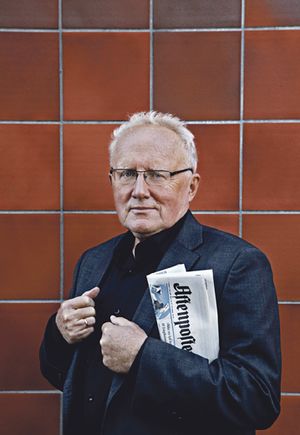Difference between revisions of "Per Egil Hegge"
m (1 school) |
m (job expand) |
||
| Line 14: | Line 14: | ||
|constitutes=journalist, editor | |constitutes=journalist, editor | ||
|birth_name=Per Egil Hegge | |birth_name=Per Egil Hegge | ||
| − | |employment= | + | |employment={{job |
| + | |title=Cultural Editor | ||
| + | |start=1992 | ||
| + | |end=1998 | ||
| + | |employer=Aftenposten | ||
| + | }}{{job | ||
| + | |title=Correspondent to Washington DC | ||
| + | |start=1962 | ||
| + | |end=1992 | ||
| + | |employer=Aftenposten | ||
| + | |description= | ||
| + | }}{{job | ||
| + | |title=Editor | ||
| + | |start=1984 | ||
| + | |end=1988 | ||
| + | |employer=Aftenposten | ||
| + | |description= | ||
| + | }}{{job | ||
| + | |title=Correspondent to Washington DC | ||
| + | |start=1977 | ||
| + | |end=1981 | ||
| + | |employer=Aftenposten | ||
| + | |description= | ||
| + | }}{{job | ||
| + | |title=Correspondent to the Soviet Union | ||
| + | |start=1962 | ||
| + | |end=1992 | ||
| + | |employer=Aftenposten | ||
| + | |description=Evicted in 1971. | ||
}} | }} | ||
| − | + | }} | |
| − | '''Per Egil Hegge''' is an influential Norwegian journalist and [[editor]]. | + | '''Per Egil Hegge''' is an influential Norwegian [[transatlantic]] journalist and [[editor]]. |
==Background== | ==Background== | ||
| − | Hegge has a degree from the [[University of Oslo]] in the subjects Russian, English and political science. As a conscript, he was part of the elite forces and also did the | + | Hegge has a degree from the [[University of Oslo]] in the subjects Russian, English and political science. As a conscript, he was part of the elite forces and also did the Russian course at what now is the [[The Norwegian Armed Forces Intelligence School]]. |
==Career== | ==Career== | ||
| − | Per Egil Hegge started working for the most influential Norwegian | + | Per Egil Hegge started working for the most influential Norwegian conservative newspaper ''[[Aftenposten]]'' in [[1962]]. |
| − | He first worked in London as the newspaper's correspondent, but was soon sent to Moscow, still formally for Aftenposten. He was evicted from the [[Soviet Union]] in 1971, among other things for contacts with [[Aleksandr Solzhenitsyn]] after him winning the Nobel Prize. | + | He first worked in London as the newspaper's correspondent, but was soon sent to [[Moscow]], still formally for Aftenposten. He was evicted from the [[Soviet Union]] in 1971, among other things for contacts with [[Aleksandr Solzhenitsyn]] after him winning the [[Nobel Prize in Literature]]. |
| − | As a | + | As a promotion for this, he became the paper's correspondent in [[Washington DC]] (1977–1981 and 1988–1992). |
| − | He kept working for ''Aftenposten'', and was editor of the paper's prestigious Saturday magazine from 1984 to 1988. From 1992 to 1998 he was editor of the culture section | + | He kept working for ''Aftenposten'', and was editor of the paper's prestigious Saturday magazine from 1984 to 1988. From 1992 to 1998 he was editor of the culture section. |
Hegge chaired the Norwegian branch of [[PEN-International]] from 1985 to 1988. | Hegge chaired the Norwegian branch of [[PEN-International]] from 1985 to 1988. | ||
Latest revision as of 22:18, 17 February 2022
(journalist, editor) | ||||||||||||||||||||||||||||||||||||||||||||||||||||||||||||||
|---|---|---|---|---|---|---|---|---|---|---|---|---|---|---|---|---|---|---|---|---|---|---|---|---|---|---|---|---|---|---|---|---|---|---|---|---|---|---|---|---|---|---|---|---|---|---|---|---|---|---|---|---|---|---|---|---|---|---|---|---|---|---|
 | ||||||||||||||||||||||||||||||||||||||||||||||||||||||||||||||
| Born | Per Egil Hegge 1940-03-06 Trondheim, Norway | |||||||||||||||||||||||||||||||||||||||||||||||||||||||||||||
| Nationality | Norwegian | |||||||||||||||||||||||||||||||||||||||||||||||||||||||||||||
| Alma mater | Oslo University, The Norwegian Armed Forces Intelligence School | |||||||||||||||||||||||||||||||||||||||||||||||||||||||||||||
Spooky Norwegian journalist and editor
| ||||||||||||||||||||||||||||||||||||||||||||||||||||||||||||||
Per Egil Hegge is an influential Norwegian transatlantic journalist and editor.
Background
Hegge has a degree from the University of Oslo in the subjects Russian, English and political science. As a conscript, he was part of the elite forces and also did the Russian course at what now is the The Norwegian Armed Forces Intelligence School.
Career
Per Egil Hegge started working for the most influential Norwegian conservative newspaper Aftenposten in 1962.
He first worked in London as the newspaper's correspondent, but was soon sent to Moscow, still formally for Aftenposten. He was evicted from the Soviet Union in 1971, among other things for contacts with Aleksandr Solzhenitsyn after him winning the Nobel Prize in Literature.
As a promotion for this, he became the paper's correspondent in Washington DC (1977–1981 and 1988–1992).
He kept working for Aftenposten, and was editor of the paper's prestigious Saturday magazine from 1984 to 1988. From 1992 to 1998 he was editor of the culture section.
Hegge chaired the Norwegian branch of PEN-International from 1985 to 1988.
Event Participated in
| Event | Start | End | Location(s) | Description |
|---|---|---|---|---|
| Bilderberg/1999 | 3 June 1999 | 6 June 1999 | Portugal Sintra | The 47th Bilderberg, 111 participants |